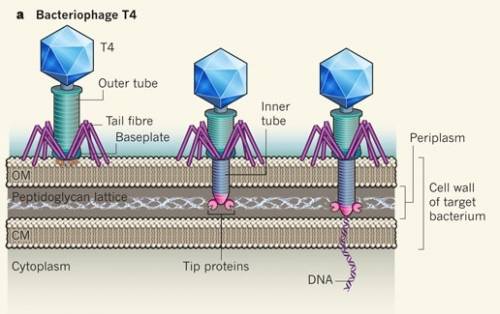 Close Topic Options
Close Topic OptionsVirus - Living Or Not?
Virus Living Not - Sciences, Education, Art, Writing, UFO - Posted: 7th Apr, 2017 - 1:07pm
Virus - Living Or Not?
Virus - Living or Not?
According to definition a virus is not living, but if it is not living then is it the opposite: dead or is there a grey area between what we define as living and dead? Viruses can inject DNA into a cell (Lytic cycle) but that process of injecting is an action. Now since it is not 'living' how is it doing that?
Image from Science Musings Blog: Geophaging.
More about the process: Lytic cycle - Wikipedia

Virus - Living Or Not? (Hover)
Not Living Virus
It doesn't fit within our definition of living. We could expand that definition, but to be frank a virus' existence is closer to that of a self propagating and entirely definitely dead crystal than a normal cell.
Instead of trying to classify viruses as living or dead, we'd be better off establishing a new category for structures that have both replicative and autonomic functions, but aren't truly alive.
Virus - Living Or Not? UFO & Writing Art Education Sciences
I wonder if such a category, exists. We have a chemist as part of the membership, although not a biologist he may know. Never was interested in biology so my knowledge is limited in this area, however what puzzles me, the act of 'knowing' what to attach to, then to drill down and inject takes some kind of 'intelligence' if I can call it that, so although it needs other properties in order to replicate it seems to 'know' what is doing and is quite effective at what it does given how it affects the world.
Not Living Virus
Its not my field either, but from my understanding, it is considerably simpler than that. For viruses and other similar bodies, docking with a cell is less a matter of knowing anything, and more like a pair of magnets becoming attracted to each other. For the virus, protein sequences meeting the proper match (Ie the outer surface of a cell) cause other proteins to contract, changing the shape of the virus such that it injects.
Have you ever seen fresh squid legs dancing when soy sauce is applied? In spite of them being quite dead, and definitely severed from anything designed to make them move, the salts cause an automatic reaction. What we're talking about is the microcellular equivalent of that kind of reaction.
Not Living Virus
No, that sounds disgusting, however what you are describing is a chemical reaction. I guess I am overthinking, however in macro terms what makes us up is the sum of all that is going on in our body and while two chemicals can have a reaction to actually latch on, drill and release DNA seems to be a number of steps with a purpose rather than simply reacting to an external force.
Virus - Living Or Not?
New link found between sex and viruses
Sexual reproduction and viral infections both rely on a functionally identical protein, according to new research. The protein enables the fusion of two cells, such as a sperm cell and egg cell, or the fusion of a virus with a cell membrane. The discovery suggests that the protein evolved early in the history of life on Earth, and new details about the protein's function could help fight parasitic diseases such as malaria. Ref. Source 5n.
Virus Living Not Sciences Education Art Writing & UFO
Giant viruses may simply be a 'Frankenstein' of smaller viruses
Viruses are thought to outnumber the microbes on Earth; both outnumber the stars in the Milky Way. A handful of giant viruses have been discovered in the past two decades, and scientists report a novel group of giant viruses with a more complete set of translation machinery genes than any other virus known to date. They believe that this discovery significantly increases our understanding of viral evolution. Ref. Source 6u.
 TOPIC: Virus - Living Or Not?
TOPIC: Virus - Living Or Not?